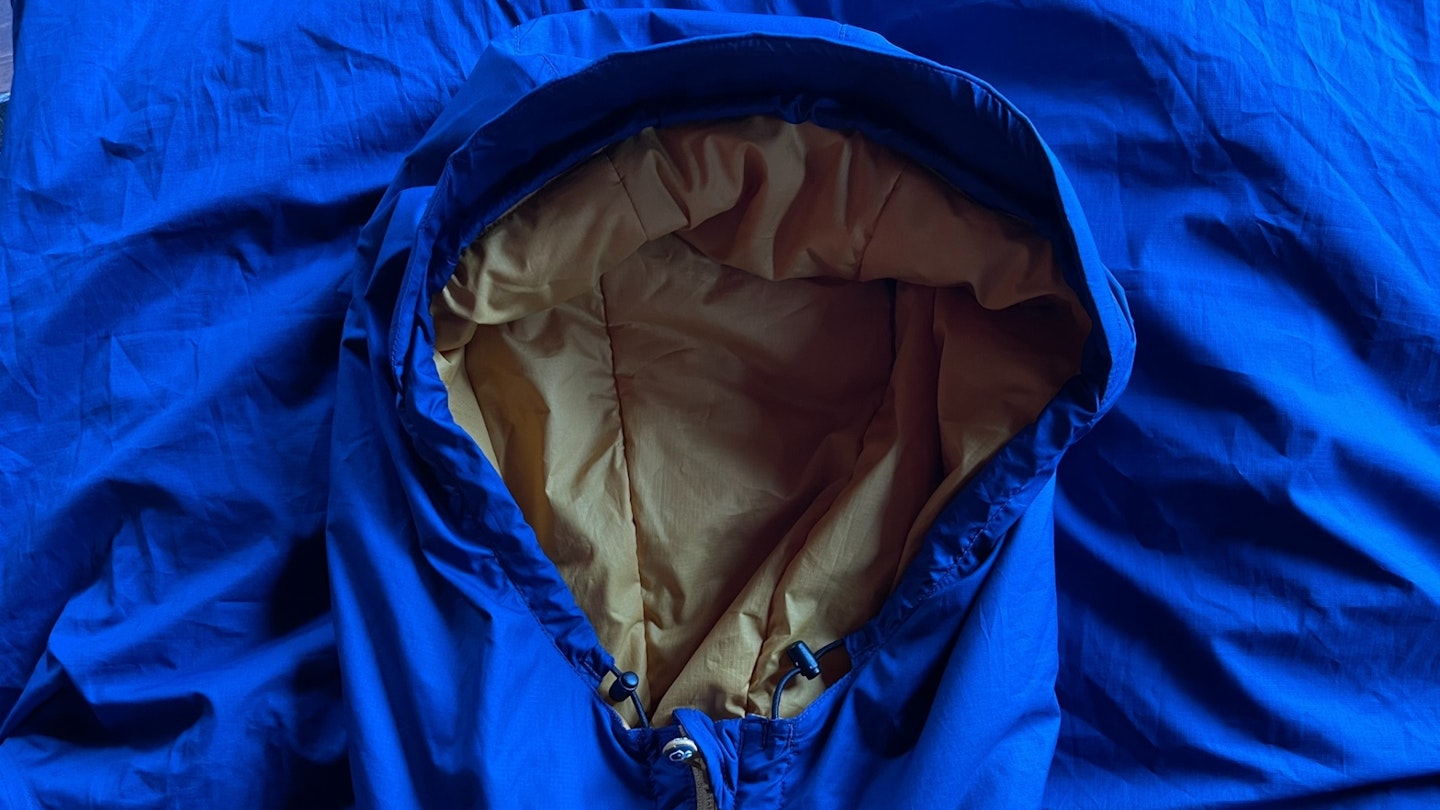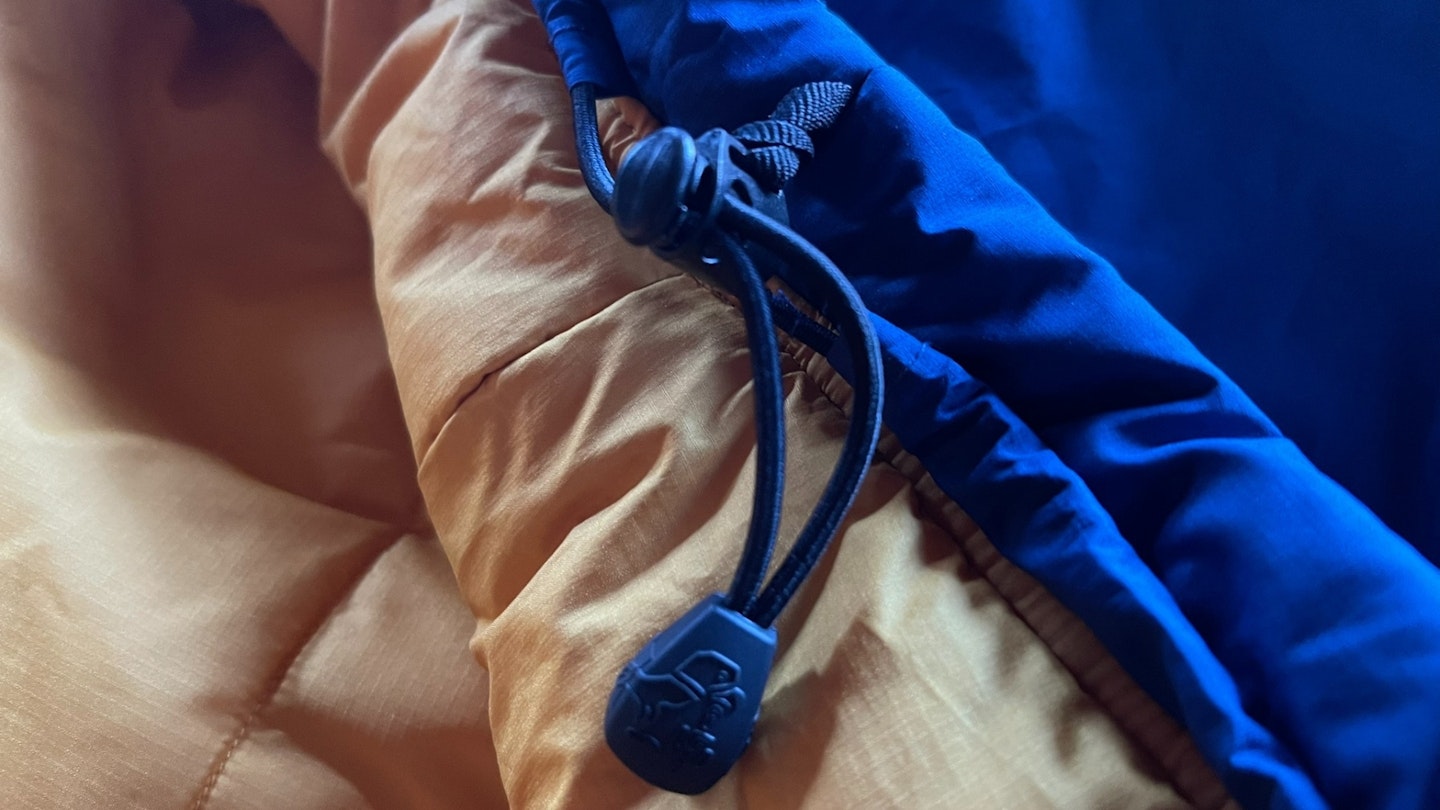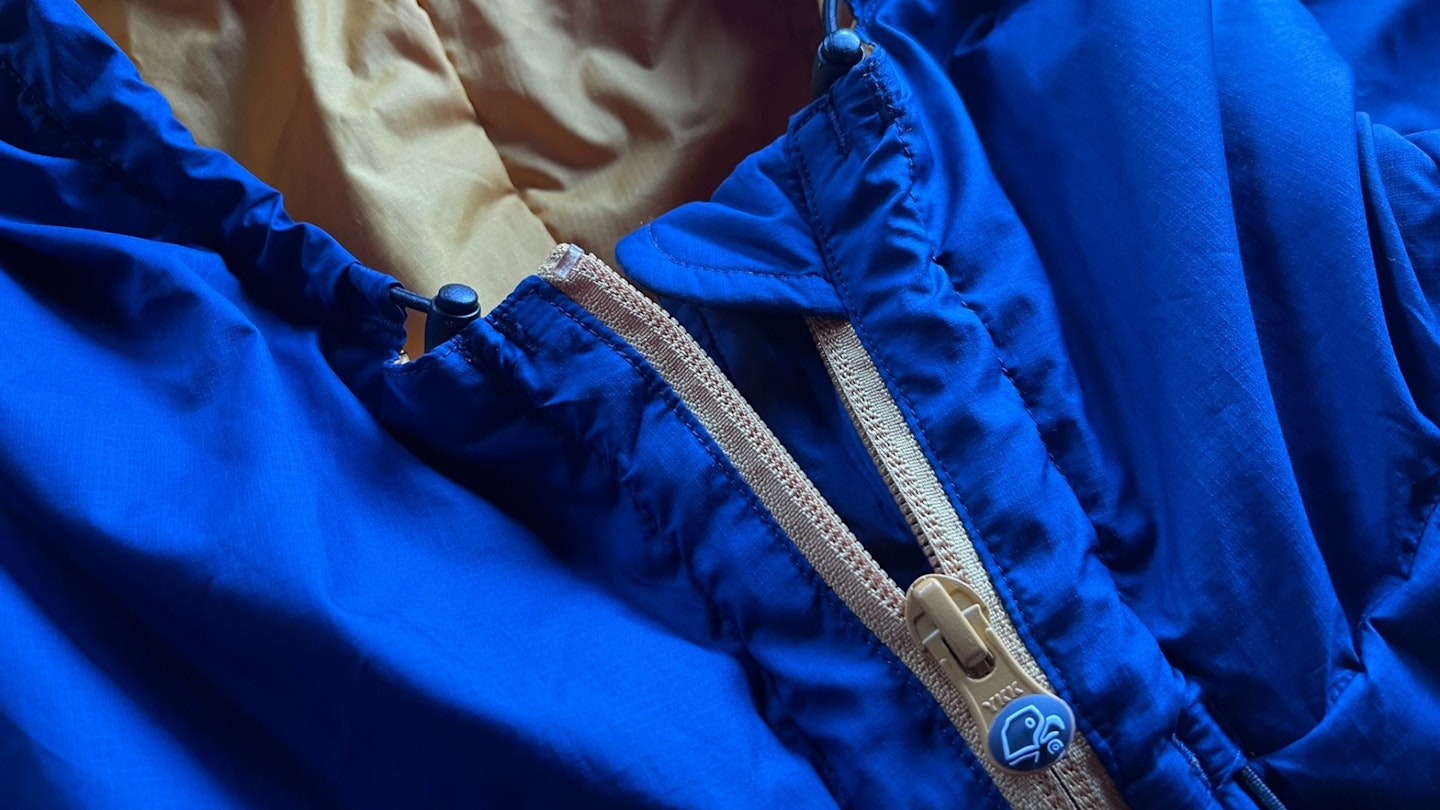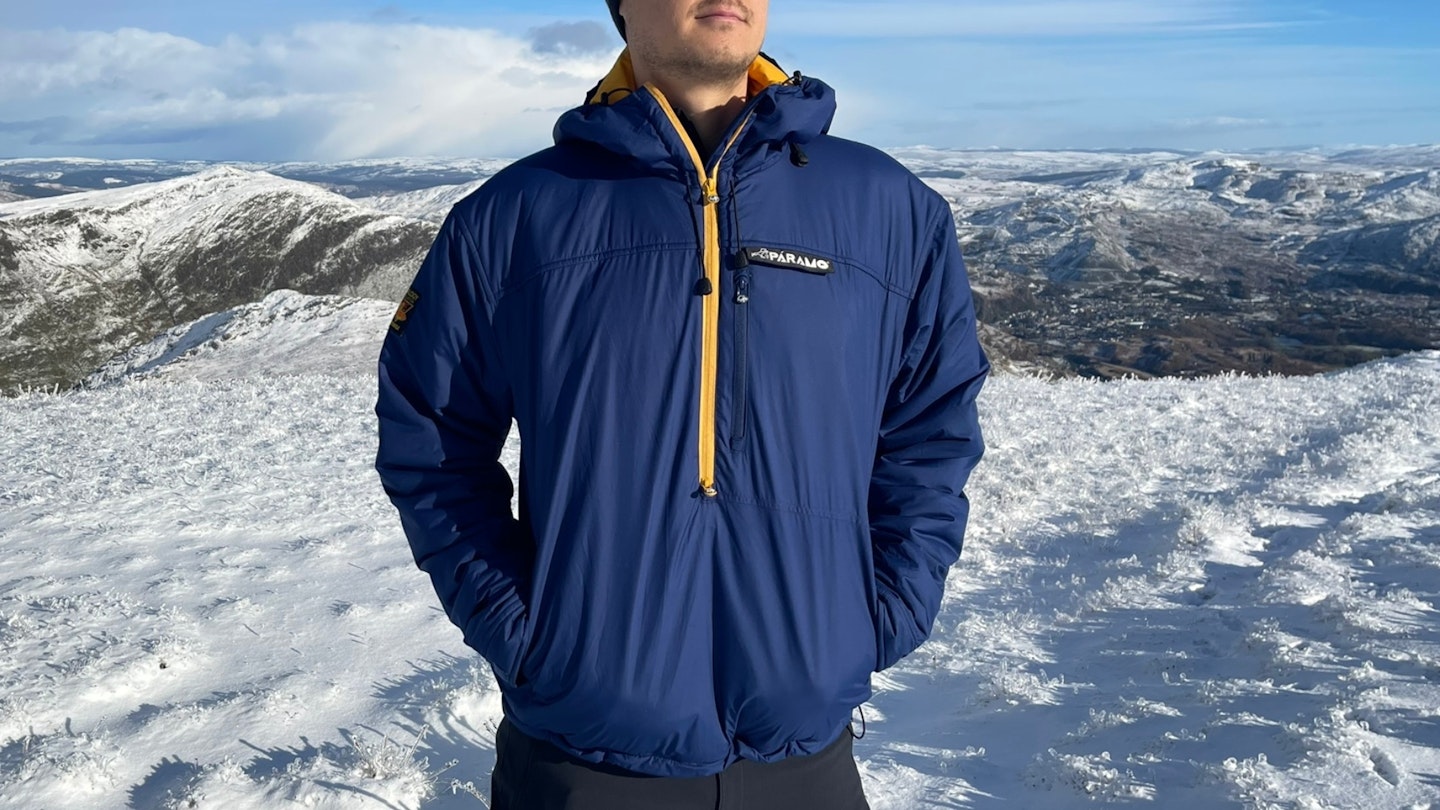You don't see so many smocks around these days, but here's one. The Paramo Torres Smock is a winter outer layer that uses synthetic insulation and is designed to be thrown over the top of whatever you're wearing to add much needed warmth, particularly when stopped in one place.
There's no doubting it's warmth, which is impressive, even when compared to some of the best down jackets.
But warmth isn't everything. Does this winter layer also deliver on fit, function and features enough to be classed as one of the best synthetic insulated jackets on the market? Here's gear tester Matt Jones with the answer...
Pros
- Very warm
- Practical
- Great hood
Cons
- Relatively heavy and bulky
- Unisex fit is boxy
- Lacks a scooped tail
| RRP: | £250 |
| Weight: | 762g / 1lb 11oz (size large) |
| Fabric and fill: | Nikwax Windproof ripstop microfibre polyester shell with Nikwax Analogy Insulator synthetic insulation (100% polyester) |
| Unisex sizes: | XS-XXL |
Design and features
The Paramo Torres Smock takes a tried and tested approach to delivering warmth: take a windproof shell and pack it full of hollowfibre polyester sheet insulation.
This is typical of most heavy-duty synthetic ‘belay’ style jackets, much loved by British climbers. But it’s a very practical overlayer for winter hillwalking, too, meaning you can just whip it out of your pack whenever you stop and stick it on over everything else you’re wearing, including a waterproof jacket.
As such, the roomy unisex cut and simple smock design makes perfect sense. Thanks to a deep half-zip, you just pull it on and off over your head.
It comes in XS to XXL sizes. So, while this isn’t quite a ‘one size fits all’ approach, it does mean the smock is fairly boxy, cut to fit a range of different body shapes.
Patterning and articulation are a lot simpler than you might find on the most technical belay jackets. You get noticeable hem lift when raising your arms. Arguably, this doesn’t matter too much, since it’s intended primarily for wearing when you’re not moving around.
In this regard, it does its job and features several practical details that allow you to fine-tune the fit a little, like a hem drawcord, cuff tabs and an adjustable hood.

Still, I'd have preferred more length in the body, especially at the rear. The straight-cut hem doesn’t help here. A scooped tail would have provided better coverage and stopped draughts from whipping up your back, especially when sitting down or bending over.
At least the sleeves are nice and long. They’re also fitted with robust Velcro cuff tabs, which cinch in really tight to provide an effective seal.
I like the pass-through kangaroo pocket, which is great for warming numb hands and is big enough to use even with winter mitts or gloves on. There’s also a zipped chest pocket for storage, though no inner dump pockets, which is a bit of a shame.
The hood design is excellent. A halo-style drawcord enables effective one-pull rear adjustment, but there are also two face drawcords to lock in heat. They’re a bit bulky, but this does make them easy to use with gloves on.
You also get a stiff wired peak, which does a good job of deflecting wind, rain and spindrift in snowy conditions. It’s not as big as the hoods of dedicated climbing jackets, though, which means you don’t get such a good fit when worn over a helmet. On the other hand, it cinches in nicely over a bare head or beanie, which will be a benefit for hillwalkers.
Fabric and fill

The Torres Smock is built from Nikwax Windproof shell fabric, a ripstop polyester finished with a PFC-free durable water repellent (DWR) treatment.
For its weight, polyester is not as strong a fibre as nylon, which is why the latter tends to be used in many premium shell fabrics. But Nikwax’s polyester is pretty tough, with a close weave and high denier count, so it offers plenty of protection from buffeting on exposed hillsides and blustery summits.
The Nikwax Analogy Insulator fill is – as far as I can tell – a pretty standard wadded sheet fill made from hollowfibre polyester. The brand doesn’t give you the specific fill weight or density, but it’s very thick and very warm, resulting in a dependable bit of kit. Bottom line? You will not be cold in this jacket.
Performance and comfort

This is a chunky smock that delivers ample warmth, even in conditions below freezing. It’s also pretty much impervious to wind and very weatherproof, continuing to insulate even if it gets wet.
All those qualities make it a practical performer for UK use. I particularly like the robust cuff tabs, deep chest zip and adjustable hood. They’re all easy to operate even with frozen fingers. And with everything fully zipped up and cinched in, it makes for a very effective cocoon.
I had it out on test throughout November in the mountains of North Wales, when we got the first snow of the season. Temperatures in the hills hovered around -2°C and got as low as -10°C when factoring in windchill.
The Torres Smock handled these conditions with ease when layered over a midweight baselayer and a fleece or shell. If anything, it can sometimes be too warm. I started descending Cadair Idris with it on and soon overheated.
The cut is accommodating, to say the least, so you don’t get great mobility, but remember this is a layer primarily designed for static use. As mentioned earlier, I'd have liked more length in the body and/or a scooped tail for better all-round coverage. But that minor niggle aside, it feels cosy and comfortable thanks to the soft lining fabrics and thick synthetic fill.
Downsides? Inevitably, it’s relatively heavy and bulky, even when compressed. You can stuff the Torres Smock inside its own hood, making for a rugby-ball sized lump, which isn’t too bad given the warmth on offer. But it will still fill the bottom of a 30-litre daypack. My test sample weighed in at 762g for a size L, which made it the heaviest winter insulated jacket on test.
Sustainability

The Torres Smock is made entirely from polyester, which ensures it's easily recyclable at the end of its life. It currently contains no recycled fibres, though, which means it uses virgin resources derived from petrochemicals – in other words, oil.
Like all Paramo garments, this smock is completely free from PFCs, the harmful fluorocarbons that have been dubbed ‘forever chemicals’, due to the fact that they never break down but instead bio-accumulate in the environment, and which the outdoor industry is now almost completely phasing out.
This garment is ethically produced in Colombia in partnership with the Miquelina Foundation, a member of the World Fair Trade Organisation. So, the product is guaranteed Fair Trade and is made in a factory that provides training, jobs and security for vulnerable women from the streets of Bogotá, Colombia.
Miquelina also attained ISO 9001 accreditation back in 2002, an international ‘gold standard’ for quality. Today, the factory manufactures 85% of Paramo’s production.
Price and competition

With a UK RRP of £250, the price is fairly high for a synthetic jacket, especially one that's a relatively simple smock design. But costs have jumped across the outdoor industry in recent years, which means that when you look at what else is on the market, the Torres Smock starts to seem much more competitive.
For example, it's significantly cheaper than high-end synthetic rivals such as Rab’s Generator Alpine (£290), Mountain Equipment’s Fitzroy (£360), Black Diamond’s Belay Parka (£300) and Patagonia’s DAS Light Hoody (£320).
With the exception of Patagonia, all those use premium fills like Primaloft Gold Crosscore, though, which is generally considered to be the highest performing synthetic insulation on the market (in terms of warmth for weight). You don’t get that here – but Paramo’s Nikwax Analogy Insulator fill is still very warm.
Verdict
The Paramo Torres Smock is a hefty, warm and cosy cocoon that is a supremely practical choice for winter hillwalking. The boxy fit could be refined though. It’s also relatively bulky, even when compressed.
Shop this product
About the author

Matt Jones is a freelance journalist based in the heart of Snowdonia National Park, he’s a vastly experienced gear tester and self-confessed outdoor kit geek. Matt’s been one of our main gear testers for the last couple of years and is the first person we call with any complicated kit queries that need in-depth and forensic analysis.





